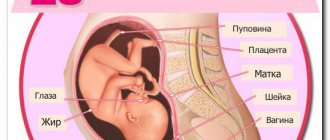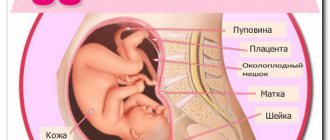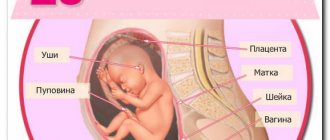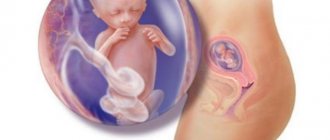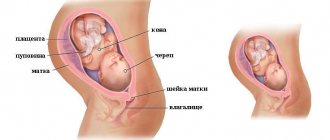- 29th week of pregnancy - how many months?
- Fetus
- Feel
- Pain
- Stomach
- Uterus
- Discharge
- Sex
- Analyzes
- Ultrasound
- Nutrition
- Weight
- Childbirth
29th week of pregnancy - how many months?
Exactly 7 months of pregnancy are behind us. Now the eighth month begins, the first week of which is the 29th week of pregnancy. You may have calculated that it's actually been a little less than a full eight months. But the fact is that each obstetric month consists of exactly 28 days or 4 weeks. Thus, in theory, there are still 3 obstetric months left before the birth.
Fetus at 29 weeks of gestation
However, the baby is already beginning to prepare for going out into the world. The immune system and heat regulation started working. The child’s blood already has a stable composition, and the bone marrow performs its functions properly.
The digestive system is ready to digest the first real food. The kidneys are also not far behind: every day they excrete 500 ml of urine into the amniotic fluid. By the way, amniotic fluid now enters the child’s stomach not only through the mouth, but also through the nose: mucus plugs have disappeared from the nasal passages.
It’s hard to believe, but in addition to the fact that the child feels tastes, smells, distinguishes light, hears sounds and feels your mood, he is already able to visually focus on something, his gaze begins to focus!
Outwardly, the child becomes more and more like a newborn: the skin brightens and straightens, the lanugo fluff disappears, and the amount of vernix lubrication decreases. But subcutaneous fat accumulates more and more: by the end of the term, the baby will have folds on the body and cheeks on the face. The genitals are already quite developed, and you most likely already know the sex of the child, but they still continue to develop.
The further you go, the more the internal organs and systems unite into a single harmonious system and begin to work harmoniously.
Now the baby is growing rapidly. Its full size at the 29th week of pregnancy is about 38 cm, weight reaches and can exceed 1200 g. Muscle tissue and ligaments continue to develop, so the limbs become increasingly stronger. You may feel this with increased tremors.
The space for somersaults is, of course, becoming less and less. Now the child is unlikely to roll over from head to toe, but every movement will be felt by the mother more and more clearly.
Fetal growth and development
Even in the eighth month, the baby’s rapid development continues. At 29 weeks of pregnancy, his own immune system begins to work. True, she is still very weak and is not able to protect herself from insidious viruses. The heat regulation system is also configured.
The bone marrow continues to develop, improving its hematopoietic function every day. And the digestive system is already ready to accept real food. As for the genitourinary system, the amniotic fluid is replenished daily with 500 ml of fetal urine.
The nervous system becomes more complex: now the baby is able not only to distinguish sounds and see light, but also to focus his gaze. The baby completely takes on the appearance of a newborn and will only gain weight and height over the subsequent years. His skin gradually brightens, and the wrinkles straighten out. The fluff disappears from the skin.
At week 29, 300 bones have already been formed in the baby’s body. In the future, some of them will grow together, and there will be 206 bones. It is interesting to note that it is by this time of pregnancy that enamel appears on the teeth. Perhaps the only organ that is not yet ready for birth is the lungs. They continue to develop until the end of pregnancy.
As for its parameters, on average the baby’s height at this time is 38 cm, weight – 1.2 kg.
Feel
Most likely, at the 29th week of pregnancy you will already notice that the fetal movements have changed their character: firstly, they have become more distinct, secondly, more noticeable, thirdly, now the baby will kick and push more and more, rather than turning over and much less tumble. And all because he has already grown enough for this - there is less and less room for activity.
In this regard, the mother will be increasingly bothered by various kinds of troubles: heartburn, bloating, constipation. Sometimes your stomach being pushed under your chest can cause a feeling of lack of air: it’s time to start learning various breathing techniques if you haven’t learned how to do it yet.
It is not uncommon for expectant mothers to experience a feeling of fever or intense heat during the third trimester. Metabolism occurs more actively, the heart also works harder, sweating increases, so it is possible that you will now have to take a shower more often.
Be careful in your movements. A displaced center of gravity often leads to falls during pregnancy, so do not make sharp turns, bends or swings.
New sensations at 29 weeks of pregnancy may include increased heart rate and low blood pressure. In addition, against the background of a reduced level of hemoglobin in the blood, which is often observed in pregnant women at this stage, you will begin to feel dizzy, and even fainting is possible.
If you still haven’t found comfortable sleeping positions, then use additional pillows and accessories in bed, since you simply need to get enough sleep and rest.
Fatigue makes itself felt more and more and is especially felt towards the end of the day. Try to lie down at least briefly during the day to rest, and also do not walk a lot, take foot baths, raise your feet to a height during the day and at night. Gradually shift all your household chores to your loved ones. And if you feel unwell or are bothered by any pain, then do not hesitate to once again disturb your doctor.
Well-being during pregnancy
Since the baby is already quite large, most likely, the expectant mother will not feel his upheavals, but he will move more and more clearly. Imagine: if previously the embryo calmly swam and tumbled in its stomach, now its body is surrounded on all sides. He feels cramped and all he can do is move and kick.
As for the feeling of the expectant mother, in the eighth month of pregnancy she may still feel heartburn and suffer from constipation, because the internal organs are now being compressed even more.
Swelling is a common occurrence. But it’s really difficult to breathe, since the uterus rises to the lungs and squeezes them too. It is especially difficult to find a comfortable sleeping position, which makes it harder to fall asleep.
In addition to swelling, varicose veins may be observed. During this period, a woman may notice pain in the breasts and nipples, which is caused by the hormone prolactin. This is how the body gradually adjusts to milk production.
Usually the amount of discharge increases. It's not scary. But if the discharge changes color, then this is the first signal of a problem within the body.
The eighth month is often accompanied by low blood pressure and increased heart rate. At this time, the pregnant woman may constantly feel sleepy, and low hemoglobin also affects her.
Pain
The further you go, the more or more likely various pains will be annoying. After all, the total weight increases all the time, and this is an additional load on the legs, spine and sacral area. Wearing a prenatal bandage, correct posture, and caring for yourself can help. Comfortable shoes, proper nutrition, weight control play an important role - a large number of different factors influence the occurrence of pain.
Legs, for example, can hurt not only from fatigue and weight gain, but also from a lack of calcium in the body. And your head may well hurt due to hunger, although decreased blood pressure and hemoglobin levels also occur. But if the pain is accompanied by strange alarming symptoms, then you should definitely tell your doctor about them. Thus, back pain accompanied by painful urination may be evidence of genitourinary diseases.
Don't worry if your limbs become numb. The nature of this phenomenon is not fully understood, but it is known that it is transitory and harmless. But if hemorrhoids (in the anus area) hurt and become inflamed, then you need to act immediately to prevent the development of hemorrhoids. At the initial stage, it is usually enough to adjust the diet.
Don’t forget also that there is less and less time left for childbirth, which means it’s time to prepare. And your body has already become involved in this process: the pelvic bones gradually soften and separate, which is accompanied by pain in this area. Pain in the pubis and perineum could be a sign of symphysitis—tell your doctor, especially if you or your loved ones notice that your gait has become “duck-like.”
But probably the most worrying thing is abdominal pain at 29 weeks of pregnancy. And there can be a lot of reasons for this. The most common one is indigestion, but we hope you can distinguish it from other pains. If there is a tugging or sharp tingling sensation in your side, then most likely it is the ligaments or, perhaps, the baby kicked you. You should be alert to pain in the lower abdomen, sharp, intensifying or growing, accompanied by other alarming signs (bloody discharge, fever).
Contraindications
There are no direct contraindications to ultrasound. At the 29th week, diagnosis is carried out if indicated after consultation with the treating doctor. Doctors do not recommend undergoing examination if the 2nd ultrasound examination was recently completed or if there are inflammatory and infectious pathologies in the body.
By personal preference, ultrasound is not performed. The procedure is possible only on the basis of doctor’s recommendations. It is also undesirable to visit diagnostics more than 5 times during the entire pregnancy.
Belly at 29 weeks pregnant
Abdominal pain at 29 weeks of pregnancy does not arise for nothing - various processes take place there, the most important of which is the growth and development of your child. But in addition to the fact that your tummy may sometimes ache, as the period increases, you will begin to feel a slight itching on the skin of your abdomen. This is caused by stretching of the skin and requires increased hydration. An ordinary high-quality cream (which can even be replaced with olive oil) will be quite enough, because if stretch marks are destined to happen, then special miracle products will not help prevent their appearance. The stomach may itch due to an allergic reaction to food, synthetic underwear, cosmetics and other irritants. Find the source of the allergy and eliminate its effect.
The only cause for concern can be very strong, unbearable itching on the skin of the abdomen, back, arms, legs and chest. But if the tests are normal, then there is no need to worry.
Rhythmic shaking in the abdomen occurs when the baby hiccups. Typically, fetal hiccups do not last long.
The further you go, the more the center of gravity will shift exactly here - into the growing tummy. Therefore, extra caution will not hurt either.
And do not be disturbed by mild cramping pain in the lower abdomen, which disappears after lying on your side and resting. This is the uterus beginning to prepare for childbirth, working through training contractions.
29 week pregnancy video
29 week pregnancy photo
Uterus
The uterus at the 29th week of pregnancy rises 8-10 cm above the navel or 29-30 cm above the pubic symphysis. It is already quite large and heavy, and you feel it when you sit or lie down.
During the third trimester, you may feel rhythmic pain in your lower abdomen from time to time. These weak uterine contractions are called training or Braxton-Higgs contractions and are not dangerous. If they cause you discomfort, then try lying down for a while, preferably on your left side.
If the pain only intensifies and becomes more frequent, then you should immediately go to the hospital. Also, bloody discharge accompanying uterine contractions or rupture of amniotic fluid should be a reason to call an ambulance.
Risks and dangers for mother and child
At this time, training contractions appear, which in some cases can develop into regular contractions.
The birth of a baby at 29 weeks has a favorable outcome, but there is no need to rush things. If you experience any discomfort or pain, you should immediately go to the hospital. For a woman, danger arises when pressure increases, which often happens due to stress on the blood vessels. There is also a possibility of gestosis, which is dangerous for the fetus. Regularly visiting your doctor and following the recommendations will help you avoid most troubles.
There is only a week left before you go on maternity leave, you should reconsider your daily routine and devote more time to rest. At 29 weeks, vigorous activities are no longer recommended, but fresh air and quiet walks will help you tune into a positive mood and improve blood circulation. It is recommended to carry an exchange card with you everywhere, where all the features of pregnancy are indicated. In the event of an unforeseen situation, it will be easier for doctors to provide assistance and make the right decision.
Discharge at 29 weeks of pregnancy
Amniotic fluid can leak in small portions or pour out at once, in a whole stream. This means that labor is about to begin and there is no time to delay going to the hospital. But even leakage of water poses a danger, so the pregnant woman is admitted to the hospital. Amniotic fluid is clear, liquid, normally colorless, odorless or has a slight sweet smell. To make sure that such discharge is or is not water, you can buy a special test at the pharmacy.
If the discharge at 29 weeks of pregnancy has changed its consistency or color, then it is better to play it safe and get a smear for infections. A bad sign is curdled, bubbling, with lumps of mucus, yellow, green, gray, purulent discharge, as well as bloody discharge - scarlet, pink, brownish. In the first case, we are most likely talking about sexually transmitted diseases and sexually transmitted infections. In the second, it is more likely about placental abruption or the threat of premature birth.
However, bloody marks on underwear do not always come from the vagina. With the development of hemorrhoids and the formation of anal fissures, blood may leak from the anus, which women often perceive as a threat to pregnancy.
Additionally, you may experience breast discharge at 29 weeks of pregnancy. This is colostrum, and it should absolutely not be squeezed out - only wiped and blotted.
To minimize the risk of pathological discharge, do not under any circumstances change your sexual partner during pregnancy, even if you are confident in his intimate health.
Sex
But a permanent partner needs to be loved in every sense of the word. If sex at 29 weeks of pregnancy does not cause you any discomfort and is not contraindicated for medical reasons, then there should no longer be any reason to refuse it. But you still need to be careful: leave uncomfortable positions, deep penetrations and “wild unbridled” sex for the future. Now spooning poses, dogi-style and others with penetration from behind will come to your aid.
Many expectant parents are embarrassed by the presence of an unborn baby during intimate moments. This mostly applies to fathers. So it’s in vain: you can’t harm the baby if you’re careful, and he’s not yet capable of spying on you.
Ultrasound of the fetal umbilical cord
An umbilical cord passes between the placenta and the embryo, which connects them to each other. An ultrasound examination determines the number of vessels in the umbilical cord, their condition, and structure.
The umbilical cord has two arteries and one vein that nourish the fetus. The vein saturates the fetus with oxygen, and the arteries serve as a outlet for processed products.
The normal length of the umbilical cord should be at least 40 cm.
An ultrasound allows you to see the entanglement of the umbilical cord, if any. The establishment of entanglement is not yet a reason for a cesarean section.
Analyzes
To make sure that sex is not contraindicated for you at 29 weeks of pregnancy, just as there are no other reasons for concern, visit your gynecologist regularly. During this period, you will have to go to the clinic once every two weeks. During the examination, the doctor will weigh you and measure basic parameters (abdominal circumference, height of the uterine fundus, blood pressure, pulse). Blood and urine tests, which have already become routine throughout your pregnancy, should not cause you any surprises by this time. They must be diligently taken on time, because the level of leukocytes, red blood cells, hemoglobin and other markers reflect the state of pregnancy, the expectant mother and, indirectly, the baby. At 29 weeks of pregnancy, blood test results may change for physiological reasons, in particular, it is very likely that the hemoglobin level will be reduced. It is very important that no protein is found in the urine.
According to indications, other tests may be prescribed at the 29th week of pregnancy: hormones (hCG, progesterone), Rh factor, sugar.
Most likely, now routine examination will be limited to standard tests. But, starting from the 30th week of pregnancy, you will have to re-visit the main specialists (therapist, ophthalmologist, cardiologist), take a smear and culture for flora, and a blood test for infections. So it is possible that the gynecologist will give you a referral for all these examinations right now.
In addition, he can “assign” you to count the baby’s movements. This is necessary to monitor its successful development.
Ultrasound at 29 weeks of pregnancy
In addition to tests, your doctor may refer you for an ultrasound at 29 weeks of pregnancy. This will make it possible to make sure that everything is fine with the baby and he is developing as expected. In addition, ultrasound may be prescribed in a number of cases when certain parameters or data need to be clarified. For example, if you have an increased risk of premature birth, then perhaps the gynecologist will offer you a pessary, and for this it would not hurt, among other things, to know the length of the cervix.
An ultrasound at the 29th week of pregnancy will show the sex of the unborn child with very high reliability. It will also assess his motor activity, heart rhythms, location, basic parameters and their compliance with the established period. Now your baby's heart beats 130-140 beats per minute.
Difficulties in pregnancy
Premature birth
A significant proportion of children born at this stage survive. But a baby born several months before the due date will need medical help.
Pregnancy pathologies can cause labor at 29 weeks:
- polyhydramnios or oligohydramnios,
- chronic diseases of the mother,
- Rhesus - conflict,
- fetal development abnormalities,
- injuries, falls,
- severe emotional shock to the mother.
Premature babies require artificial ventilation due to the imperfection of the respiratory system; in some, the immune system and heat regulation system are not yet fully developed. Therefore, such babies are nursed in specialized incubators, where conditions are artificially created for the maturation of all the baby’s systems.
Isthmic - cervical insufficiency
Occurs when the cervix is not long enough. During pregnancy, the cervix plays the role of a “lock”, holding the growing fetus in the uterine cavity. If the cervix is shorter than 25 mm, there is a risk of premature labor. In this case, as with softening of the cervix, the woman is advised to rest more, placing a cushion under the pelvic bones, and avoid any overexertion and stress. Sometimes inpatient treatment is indicated.
Insufficiency of placental blood flow
This is a dangerous condition in which the placenta cannot provide the baby with enough oxygen and nutrients. There can be many reasons for this phenomenon:
- mature age of mother,
- unfavorable gynecological history,
- presence of cardiovascular diseases in a pregnant woman,
- wrong lifestyle.
When choosing treatment tactics, gynecologists rely on the reasons for placental insufficiency. The main goal of treatment is to prevent delays in fetal development and improve uteroplacental blood flow.
Placental abruption
Symptoms of placental abruption at week 29 are bleeding, sharp pain in the lower abdomen and lower back, dizziness, fainting. Causes:
- abdominal trauma,
- non-compliance with the principles of a healthy lifestyle,
- chronic diseases of the mother.
The prognosis largely depends on the degree of detachment.
With timely medical care, there is a chance to save the life and health of mother and child.
Intrauterine infection of the fetus
Rubella, cytomegalovirus, toxoplasmosis and herpes - these infectious diseases are combined into a common group of Torch infections . They are very dangerous and cause multiple fetal developmental abnormalities, in most cases incompatible with life. The main preventive measures are timely vaccination during the preparation for pregnancy.
Nutrition
You have a much better chance of successfully bearing a healthy baby if you eat well and properly during pregnancy.
At week 29, the baby takes up to 250 mg of calcium from the mother’s body every day, and these losses must certainly be replenished. Do not forget that it is best to consume calcium of plant origin, since animal sources can cause early ossification of the skull, which is undesirable when the baby passes through the birth canal.
At the 29th week of pregnancy, the muscle tissue of the fetus is very actively developing, so you can’t do without protein. If for some reason you don’t eat meat, then compensate for the protein with plant foods.
Constipation and hemorrhoids can often be avoided with just proper nutrition. Be sure to eat fiber, that is, fresh vegetables and fruits. And to avoid heartburn, break your daily menu into small portions and avoid fried foods.
Also minimize the consumption of salt (it retains fluid in the body and provokes the appearance of edema), fatty, smoked, spicy foods, flour and sweets. In general, in ancient times, starting from approximately the 30th week of pregnancy, women fasted. Today this is not at all necessary, but keep your caloric intake under control at all times.
Try to constantly “feed” your hemoglobin. This will be facilitated by the introduction of beets, spinach, oatmeal and buckwheat, liver and tongue into the diet. Remember that chocolate does not cure anemia, but it leads to weight gain very quickly.
Weight
This is exactly what is undesirable. Weight during pregnancy must be controlled until the very end. In the third trimester, your gain should not exceed an average of 50 g per day or 350 g per week, and by week 29 you could have gained no more than 11.5 kg from the very beginning of pregnancy. Naturally, options are possible, but they should not differ very much from the established norms. If your parameters have crossed the permitted line, then together with your doctor, select a suitable “diet”.
Childbirth at 29 weeks of pregnancy
There is still quite a long time before the expected birth - 3 months or 12 weeks. But, unfortunately, no one is immune from their premature onset, and there can be quite a few reasons for this. Moreover, in some cases, childbirth at 29 weeks of pregnancy is the best way out of the situation, and the doctor decides not to carry the baby to term.
Undoubtedly, the longer the baby stays in his mother’s tummy out of his allotted time, the more ready he will be to meet the outside world. Premature babies require qualified medical care, modern nursing equipment, a lot of money and a lot of patience, and then attention, warmth and affection. But the most important thing is that a child born at 29 weeks of pregnancy is able to survive. After all, his immune system is already functioning by this time. So you should not despair if childbirth suddenly occurs at 29 weeks of pregnancy. The main thing is that a woman will become a mother, and this is a special status in life.
